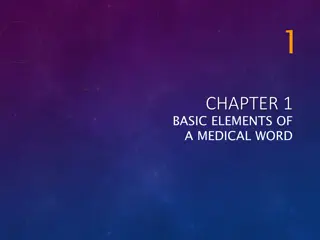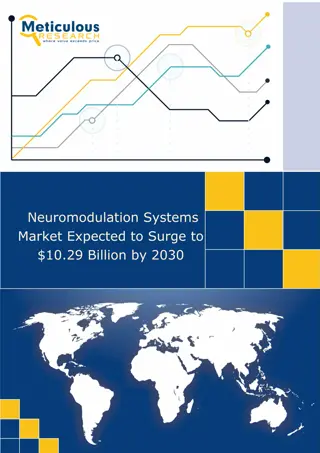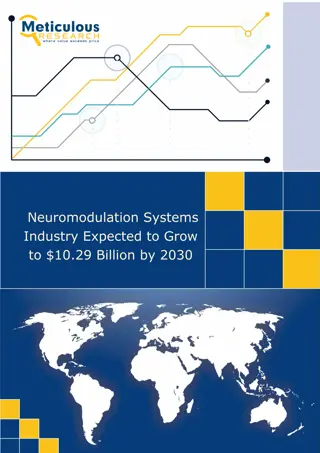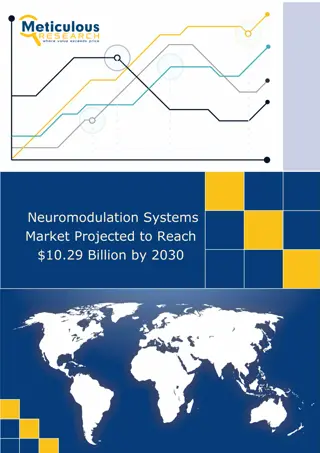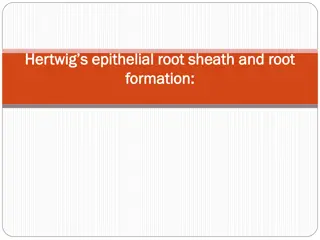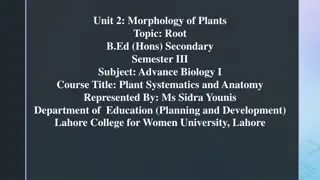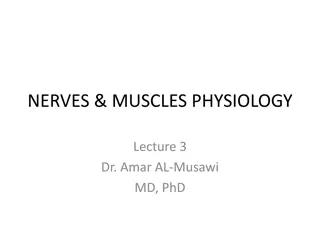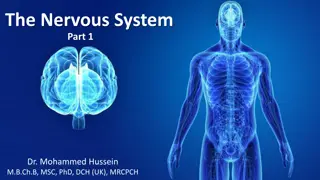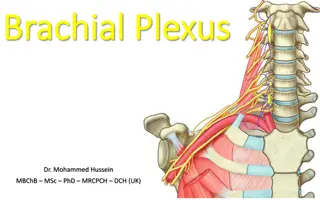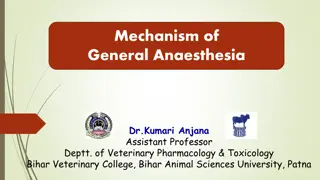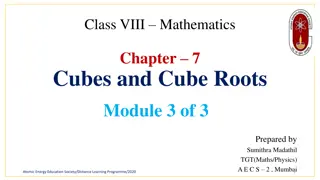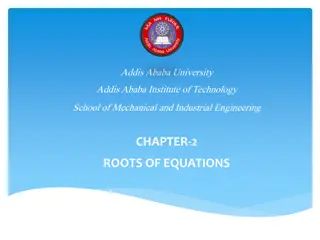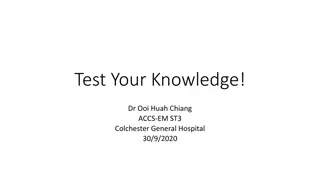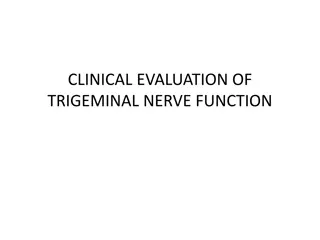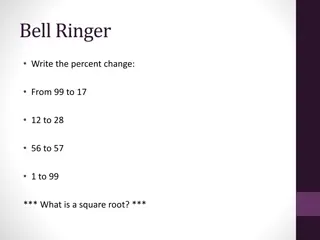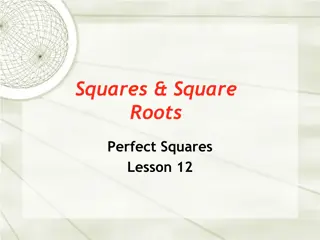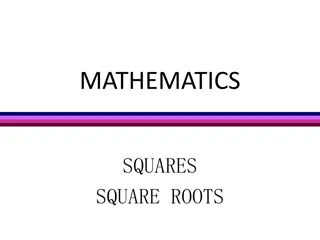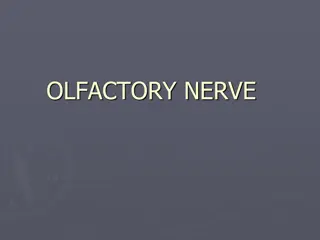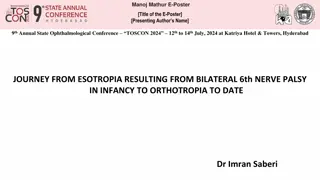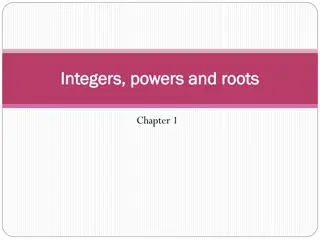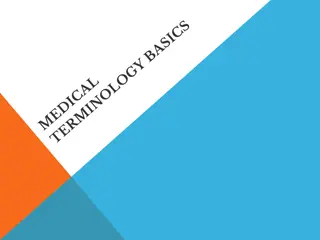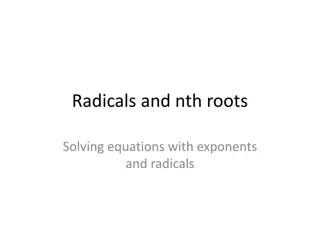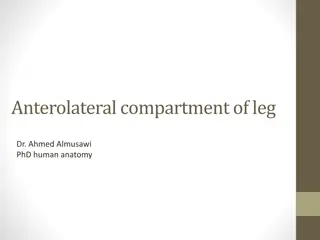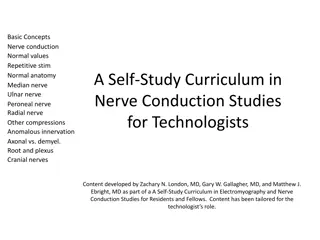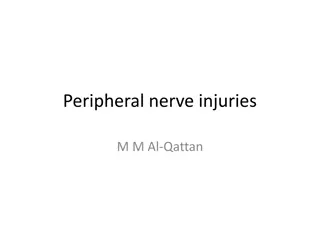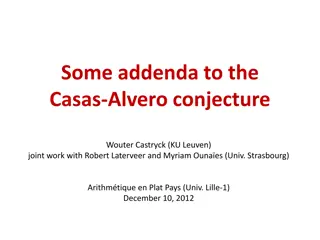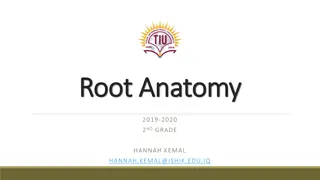The Popliteal Fossa
The popliteal fossa, a shallow depression at the back of the knee joint that serves as a passage for main vessels and nerves. Discover its boundaries, roof, floor, and contents like the popliteal artery, popliteal vein, tibial nerve, and common fibular nerve.
3 views • 9 slides
SMALL FIBRE
Small fiber neuropathy involves thin and unmyelinated nerve fibers, leading to various sensory disturbances. The Erlanger and Gasser classification details the different types of nerve fibers involved. Symptoms include burning, tingling, and numbness, often presenting in a stocking-glove pattern. Di
4 views • 53 slides
Understanding Oxygen Diffusion Rate Measurement in Plant Roots
Measurement of oxygen diffusion rate in plant roots is crucial for assessing soil oxygen levels and aeration conditions. The Oxygen Diffusion Rate (ODR) method utilizes a platinum microelectrode to simulate roots, allowing for the calculation of oxygen flux at the root-soil interface. By monitoring
1 views • 5 slides
Nerve and muscle physiology
The lecture delves into the intricate structure of nerves, highlighting the morphology of nerve fibers and the process of myelination. It explores the classification of nerve fibers, emphasizing the role of dendrites, axons, and synaptic functions in the nervous system. The significance of Schwann c
4 views • 29 slides
Root Anatomy and Functions
The root system of plants consists of primary and secondary roots made up of dermal, vascular, and ground tissues. Roots play a crucial role in absorbing water and minerals, providing support, anchoring the plant, and storing food. Taproots and fibrous roots are two common types, each serving unique
2 views • 6 slides
Understanding Medical Word Elements: Roots, Combining Forms, Suffixes, and Prefixes
Medical terminology uses word elements like roots, combining forms, suffixes, and prefixes. Word roots provide the main meaning, combining forms connect elements, suffixes modify word meaning, and prefixes are placed at the beginning of words. Examples illustrate how these elements are used in medic
6 views • 13 slides
Neuromodulation Systems Market Expected to Surge to $10.29 Billion by 2030
Meticulous Research\u00ae\u2014a leading global market research company, published a research report titled\n \u2018Neuromodulation Systems Market by Type (Spinal Cord, Sacral Nerve, Vagus Nerve, Deep Brain Stimulation),\n Application (Parkinson's Disease, Tremor, Depression, Epilepsy, Gastroparesis
0 views • 3 slides
Neuromodulation Systems Industry Expected to Grow to $10.29 Billion by 2030
Meticulous Research\u00ae\u2014a leading global market research company, published a research report titled\n \u2018Neuromodulation Systems Market by Type (Spinal Cord, Sacral Nerve, Vagus Nerve, Deep Brain Stimulation),\n Application (Parkinson's Disease, Tremor, Depression, Epilepsy, Gastroparesis
0 views • 3 slides
Neuromodulation Systems Market Projected to Reach $10.29 Billion by 2030
Meticulous Research\u00ae\u2014a leading global market research company, published a research report titled \n\u2018Neuromodulation Systems Market by Type (Spinal Cord, Sacral Nerve, Vagus Nerve, Deep Brain Stimulation), \nApplication (Parkinson's Disease, Tremor, Depression, Epilepsy, Gastroparesis
1 views • 3 slides
Understanding Word Meanings Through Roots and Affixes in Education
Exploring how to decipher unfamiliar words by analyzing their roots, prefixes, and suffixes from a linguistic perspective. Latin roots and examples are provided to demonstrate how word parts contribute to the overall meaning of a word.
1 views • 69 slides
Formation of Hertwig's Epithelial Root Sheath in Tooth Development
The formation of Hertwig's Epithelial Root Sheath (HERS) is crucial in determining the shape, length, and number of roots in teeth. It initiates the formation of radicular dentin, marking the beginning of root development after enamel and dentin formation. HERS consists of outer and inner enamel epi
0 views • 29 slides
Morphological Characters of Roots in Plant Systematics and Anatomy
The morphology of plant roots is essential in understanding plant systematics and anatomy. Roots are categorized into two main groups: Tap Roots and Adventitious Roots. Tap roots directly arise from the seed and can be fibrous, tuberous, conical, fusiform, or napiform. Adventitious roots develop fro
1 views • 7 slides
Understanding Nerves and Muscles: Physiology Insights by Dr. Amar AL-Musawi MD, PhD
Explore the intricate world of nerve fiber morphology, myelination, and classification in this enlightening lecture by Dr. Amar AL-Musawi. Delve into the significance of myelination in enhancing nerve function and learn about factors affecting conduction velocity. Discover the role of glial cells in
0 views • 15 slides
Understanding the Basics of the Nervous System with Dr. Mohammed Hussein
Explore the fundamentals of the nervous system in Part 1 with Dr. Mohammed Hussein, covering nerve cells, cellular processes, types of neurons, nerve structure, blood vessels, grey matter, and afferent and efferent neurons. Gain insights into the key components that make up this intricate system.
0 views • 12 slides
Understanding the Brachial Plexus Anatomy and Function
The brachial plexus is a crucial network of nerves in the upper limb, formed by nerve fibers originating from C5 to T1 spinal levels. It plays a significant role in innervating the upper extremity muscles and providing sensory feedback. The plexus is categorized into roots, trunks, divisions, cords,
0 views • 55 slides
Mechanism of General Anaesthesia Theories: Lipid Solubility, Surface Tension, Microcrystal, Protein Binding
Mechanism of general anaesthesia involves theories focusing on the interaction of anaesthetics with cell membrane components like lipids and proteins. The Lipid Solubility theory emphasizes the importance of an anaesthetic's affinity and solubility in nerve cell membranes, while the Surface Tension
1 views • 10 slides
Understanding Cube Roots and Cube Root Calculation Methods
Explore the concept of cube roots and various methods for calculating cube roots such as prime factorization and estimation. Learn how to find the length of the side of a cube given its volume. Dive into examples and see how cube roots are the inverse operation of finding the cube. Gain insights int
1 views • 21 slides
Understanding Roots of Equations in Engineering: Methods and Techniques
Roots of equations are values of x where f(x) = 0. This chapter explores various techniques to find roots, such as graphical methods, bisection method, false position method, fixed-point iteration, Newton-Raphson method, and secant method. Graphical techniques provide rough estimates, while numerica
0 views • 13 slides
Exploring the Significance of Roots and Identity in Human Life
The lesson revolves around the concept of roots and identity in human life, emphasizing the deep connection individuals have with their origins. It discusses the longing to return home during significant occasions like Eid, highlighting how roots shape a person's sense of belonging and identity. Thr
0 views • 15 slides
Leprosy Nerve Examination by Dr. N. K. Kansal
This informative content provides a detailed guide on leprosy nerve examination conducted by Dr. N. K. Kansal, an Associate Professor. It covers the procedure for palpation of a nerve, emphasizing correct patient positioning and gentle palpation techniques. The importance of comparing nerves on both
0 views • 16 slides
Unveiling the Roots of Earth and Land Terminology
Delve into the roots of "terr," "terra," and "geo" which signify the concepts of earth and land. Explore words like Mediterranean, subterranean, and geographer that are derived from these roots, along with their meanings. Discover how these terms are interconnected with geography, geology, terraces,
0 views • 23 slides
Understanding Facial Nerve Lesions: Clinical Scenarios and Anatomy Overview
A comprehensive exploration of facial nerve lesions through real-life clinical scenarios and detailed anatomical insights. Dive into cases involving trauma, fractures, and abscesses to understand the varied manifestations of these lesions. Learn about the functions of the facial nerve, its segments,
0 views • 22 slides
Clinical Evaluation of Trigeminal Nerve Function
Sensory evaluation of trigeminal nerve function involves assessing exteroceptive sensations across its divisions, identifying sensory losses due to lesions, and distinguishing different types of lesions affecting sensation on the face. Motor evaluation focuses on the muscles of mastication to detect
0 views • 34 slides
Understanding Square Roots and Estimation Methods
Explore the concept of square roots, learn how to estimate them without calculators using perfect roots, understand positive and negative square roots, and master the fundamentals through examples. Discover the relationship between perfect roots and square roots, and enhance your mathematical skills
0 views • 7 slides
Understanding Perfect Squares and Square Roots
Explore the concept of perfect squares and square roots in this educational lesson. Learn how perfect squares are numbers that can be represented by arranging objects in a square, and understand the relationship between square numbers and their square roots. Engage in activities to identify perfect
0 views • 28 slides
Exploring Mathematics: Squares, Square Roots, and Area Formulas
Discover the fascinating world of mathematics by delving into squares, square roots, and area formulas. Explore the concepts of squares, rectangles, and triangles while uncovering the relationships between them. Learn about exponents, the Pythagorean Theorem, and the significance of square roots. En
0 views • 11 slides
Exploring the Olfactory Nerve and Its Role in the Sense of Smell
The olfactory nerve, the first cranial nerve, plays a crucial role in our sense of smell. It is unique for its ability to regenerate, with basal cells facilitating this process. The olfactory system is responsible for detecting odors and is essential for various behaviors in mammals. This system con
0 views • 20 slides
Understanding Facial Nerve Disorders: An Overview
Facial nerve disorders can lead to various symptoms such as facial paralysis and otalgia. This article covers the embryology, anatomy, and neuropathophysiology of the facial nerve. The development of the facial nerve complex occurs in the early stages of gestation, and abnormalities may be associate
0 views • 39 slides
Journey from Esotropia Resulting from Bilateral 6th Nerve Palsy in Infancy to Orthotropia
A detailed case study presented at the 9th Annual State Ophthalmological Conference showcases the successful management of esotropia resulting from bilateral 6th nerve palsy. The journey of a 30-year-old male patient from childhood inward eye deviation to achieving orthotropia post-surgical interven
0 views • 6 slides
Understanding Integers, Powers, and Roots: A Comprehensive Guide
Explore the world of integers, powers, and roots in this educational chapter. Learn how to multiply and divide integers, calculate squares and square roots, understand laws of indices, and master the order of operations. Discover concepts like LCM, HCF, prime factorization, natural and rational numb
0 views • 24 slides
Understanding Roots and Prefixes for Better Vocabulary Comprehension
The reading portion of the ACCUPLACER test intentionally includes unfamiliar vocabulary to test your ability to infer meaning from roots. This guide explains the importance of Greek and Latin roots, provides examples, and offers insights on how to decipher words by understanding roots, prefixes, and
0 views • 10 slides
Understanding the Structure of Medical Terms
Medical terms consist of word roots, prefixes, suffixes, and combining vowels rooted in Greek and Latin. Word roots provide the core meaning, prefixes modify it, suffixes indicate conditions, and combining vowels connect roots. Recognizing these elements aids in deciphering complex medical terminolo
0 views • 10 slides
Exploring Greek, Latin, Man, Manu, Ject, and Sect Word Roots
Delve into the origins and meanings of words derived from Greek and Latin roots, such as "ped" relating to foot, "man" and "manu" referring to hand, "ject" involving throwing, and "sect" related to cutting or dividing. Uncover the connections between these roots and a variety of English words, expan
0 views • 7 slides
Solving Equations with Exponents and Radicals
Explore the concepts of radicals and nth roots in solving equations involving exponents and radicals. Understand how to find the domain and range of functions graphically. Practice changing between radical and exponent notation, evaluating nth roots of real numbers, and solving real-life problems us
0 views • 33 slides
Understanding the External Structure and Functions of Plant Roots
Explore the external structure of plants, focusing on the root system and its specialized types like tap roots, aerial roots, stilt roots, and prop roots. Learn about the functions of roots, including anchoring plants, absorbing water and minerals, and supporting new plant growth from various exampl
0 views • 12 slides
Overview of Leg Compartments and Nerve Supply in Human Anatomy
This informative content provides detailed insights into the anterolateral compartment of the leg, facial compartments, muscles in the lateral compartment, nerve supply, anterior compartment of the leg, blood, and nerve supply, deep fibular nerve distribution, dorsum and dorsalis pedis artery. It di
0 views • 10 slides
Understanding Electrical Concepts in Nerve Conduction Studies
Exploring the fundamental electrical properties in nerve conduction studies, including charge, voltage, current, and impedance. Learn about normal values, anatomy, and anomalies in nerve function. This self-study curriculum is designed for technologists interested in electromyography and nerve condu
0 views • 73 slides
Overview of Peripheral Nerve Injuries and Brachial Plexus Injuries
Explore different types of peripheral nerve injuries including Erb's palsy, Klumpke palsy, isolated axillary nerve injury, and isolated musculocutaneous nerve injury. Learn about the anatomy, causes, motor and sensory exams, and management of these injuries. Understand the myotomes and dermatomes as
0 views • 19 slides
Addenda to Casas-Alvero Conjecture: Polynomial Derivatives and Common Roots.
In this research work, the Casas-Alvero conjecture is explored, focusing on polynomials and their derivatives, and the common roots they share. The study delves into the normalization of roots under various transformations, using p-adic methods and Gröbner bases. Noteworthy findings include implica
0 views • 24 slides
Understanding Plant Roots: Anatomy, Functions, and Types
Delve into the world of plant roots and explore their anatomy, functions, and different types such as taproot and fibrous root systems. Discover how roots absorb water and minerals, anchor plants in the ground, transport nutrients, and store food. Learn about the primary and secondary root structure
0 views • 13 slides





